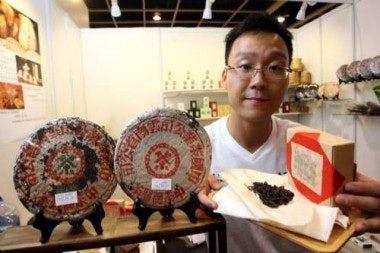8,000 RMB Pot Of Tea On Menu At Hotel "Leisure Club" In Haikou, Hainan Province#

With its vast size and population, rapidly growing economy and often "Wild West" atmosphere, there's no shortage of stories of Chinese excess in the Chinese- and English-language media. This week, one of these stories, about a "leisure club" at a high-end hotel in Haikou, Hainan province, offering a suitably high-end pot of tea for 8,000 RMB (US$1,100) caught our eye. While we're familiar with stories of cakes of Pu'erh tea selling at auction for tens of thousands of dollars, $1,000 a pot sounds incredible even for a flashy "leisure club" in one of China's up-and-coming luxury playgrounds.
From the original Chinese-language article (translation by Jing Daily team):
Recently, a new leisure club at a hotel in Haikou brewed up an outrageously priced pot of tea: one costing upwards of 8,000 RMB, which has left people dumbstruck. Is this all just business hype, or is it really worth the price? Or is it just a status symbol for a small number of high-end consumers? Public opinion is mixed. Yesterday, this reporter visited the leisure club, which is considered the highest-quality and highest-priced in Haikou, to uncover the mysteries of this pricey tea.
[I introduced myself to the 60-year-old man I was referred to by a waiter at the establishment.] The man, surnamed Luo, introduced himself as the proprietor of the leisure club. The title printed on his business card was "Guangdong & Hong Kong Senior Tea Expert."
Mr. Luo said he was born in Guangdong province, but moved with his family at a very young age to Hong Kong. His family has been dealing in tea for generations, so you could say Luo comes from a true "tea family."
In the 1980s, Luo traveled from Hong Kong to Shenzhen to set up a factory. Later, he moved to Beijing to start a company. [In 2000, he moved to Yunnan province to invest in the Pu'erh tea industry, which he felt had great growth potential.] Luo told this reporter that some of the Pu'erh teas he invested in ten years ago have appreciated 20 times in value.
Mr. Luo said he has focused his energy solely on the tea business since 2000. Currently he operates several tea leisure clubs, in Kunming [Yunnan province -- JD], Guangzhou (where he also has a specialized Pu'erh tea shop), Shenzhen, Dongguan, and Haikou -- where he owns three locations.
In ancient China, Pu'erh was offered as a tribute to the imperial palace. Nowadays, a 370 gram cake of aged Pu'erh tea from the 1940s can sell for as much as 160,000 RMB (US$23,440). Luo showed me his product display case, where I saw a 370 gram cake of Pu'erh tea from the 1980s worth 38,000 RMB (US$5,600). Mr. Luo told me that his family owns a cake of tea from the 1970s worth over 60,000 RMB ($8,800).
Luo explained that most of the customers who come to his club to drink tea are white-collar business people. Tea prices range from a few hundred to several thousand RMB. A very good tea starts at around 2,000-3,000 RMB, but the highest-quality teas range in price up to 8,000 RMB. However, the highest-priced tea must be reserved one week in advance, because Luo is very particular about his high-end teas and must spend time arranging specialized tea-making tools and must bring in an experienced tea-making expert to prepare the tea. All of this is meant to ensure his guests see this as a special honor.
Opinions differed when I asked people about the price of Luo's teas. A customer with the surname Fu, an Assistant General Manager at a Hainan real estate company, said he often takes business acquaintances to Luo's teahouse, and although a good pot of tea costs a few thousand RMB, treating guests to this kind of top-quality tea gives him a great deal of "face," so he feels it's worth the price.
This reporter then interviewed a teacher by the name of Wang on the streets of Haikou, asking him whether he feels it's acceptable to spend 8,000 RMB on a pot of tea. Wang was blown away by this concept, and said drinking an 8,000 RMB pot of tea would be like drinking the equivalent of several months of his salary. Mr. Wang said this kind of extravagant consumption was only reserved for a few very rich people, and that people with an average salary couldn't afford it.
Mr. Zhu, a lawyer at a Haikou law firm, said that tea consumption reflects market conditions. As long as the seller marks a price and provides honest and accurate information about the product to consumers, and if consumers can accept this, then there's no harm -- the consumer's free to decide whether he or she wants to pay the price.
A large number of other Haikou residents felt it would be hard for this luxuriously priced tea to find a market, and that it might just be hype and gimmicks on the part of the [leisure club] more than anything else.
This article has a light-hearted tone, and clearly a $1,000+ pot of tea is extravagant. But it begs the question -- with the hundreds of thousands of newly-minted millionaires and billionaires in China's largest cities spending lavishly on luxury items, could rare tea (already coveted by many wealthy Chinese) join rare wine, scotch and cognac as a "status symbol" drink-of-choice?